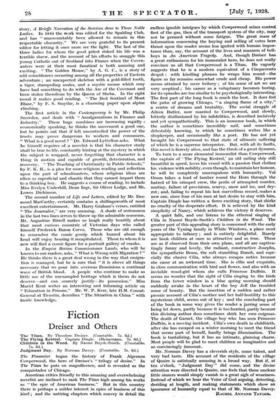Fiction
Dreiser and Others
7s. 6d.) Judgment Day. By Norman Davey. (Constable. 78. 6d.) The Financier began the history of Frank Algernon Cowperwood, the hero of Dreiser's " trilogy of desire." In The Titan he puts on magnificence, and is revealed as the conquistador of Chicago.
American critics friendly to this amazing and overwhelming novelist are inclined to rank The Titan high among his works as " the epic of American business." But in this country there is perhaps a milder interest in epics of business of this kind ; and the untiring chapters which convey in detail the
endless ignoble intrigues by which Cowperwood seizes control -first of the gas, then of the transport system of the city, may not be perused without some fatigue. The great mass of information concerning the buying and selling of votes here thrust upon the reader seems less ignited with human impor- tance than, say, the account of the lives and manners of bell- boys in An American Tragedy. And, though Dreiser has a great enthusiasm for his immoralist hero, he does not really convince us all that Cowperwood is a Titan. He vaguely suggests that he is a modern equivalent of a Cinquecento despot : with kindling phrases he wraps him round—the
figure so far remains somewhat crude and cheap. His power seems attained by mere bribery ; of his sense of art we are very sceptical ; his career as a voluptuary becomes boring, for its episodes are too similar to be psychologically interesting. The first part of the long book is much the best. It does feel the pulse of growing Chicago, " a singing flame of a city," a centre of dreams and brutality. The social struggle of Aileen Butler, now married to Cowperwood, and slowly, bitterly disillusioned by his infidelities, is described incisively and yet sympathetically. This is an immense book, in which the author is sometimes incredibly naif, and sometimes detestably knowing, in which he sometimes writes- like a shopkeeper, and occasionally like a poet. He has not yet brought his Cowperwood to that state of ultimate suffering of which he is a supreme interpreter. But, with all its faults, this novel is fiercely alive, and has the throb of a great dynamo.
To turn to a more elemental immoralist than Cowperwood, the captain of ' The Flying Kestrel,' an old sailing ship still beautiful in speed, loves his vessel with a passion that clothes his violence with nobility, even though, to maintain her honour, he will be completely unscrupulous with humanity. Val Orson takes a load of lumber round the Horn through the hatred of his crimped crew, the perils of attempted murder, mutiny, failure of provisions, scurvy, snow and ice, and dry- rot ; and, failing to repeat his last marvellous record, makes a new one, since four of his men at last desire to stay with him. Captain Dingle has written a fierce exciting story, that shirks no cruelty of the desperate effort. It is relieved by the kind simplicity of Nancy, which achieves the victory it deserves.
A quiet falls, and one listens to the ethereal singing of Cilia in Naomi Royde-Smith's Children in the Wood. The greater part of this appealing story is concerned with the early years of the Vyning family in White Windows, a place most appropriate to infancy ; and is entirely delightful. Rarely are book children at once so attractive and so true. These are as if observed from their own plane, and all are captiva- tingly funny and lovely, the radiant, constructive Josephs, the sympathetic Brum, the soft stumbling Bunch, and espe- cially the elusive Cilia, who always escapes notice because she came at an awkward time. She is elfin and exquisite, in close communication with bird and flower, and also with an invisible wood-girl whom she calls Primrose Duffrin. It seems no wonder that the sight of Cilia singing to the birds from the tower window in a blue spring morning should suddenly awake in the heart of the boy Jeff the troubled sense of beauty. But the insertion of a sudden and rather prosaic account of Cilia's mother and her half-hostility to this mysterious child, seems out of key ; and the concluding part of the book in some way gives the reader a jarring sense of being let down, partly because it is too hurried, partly because this divining author does sometimes shirk her own enigmas. The death of Garnet, the village boy who has seen Primrose Duffrin, is a moving incident. Cilia's own death in childbirth, after she has escaped on a winter morning to meet the friend that seems part of herself, hardly brings illumination. The book is tantalizing, but it has an intimate, glancing charm. Most people will be glad to meet children so imaginative and so convincingly innocent.
Mr. Norman Davey has a cleverish style, some talent, and very bad taste. His account of the residents of the village of Quaire is satirically amusing in a broad way. But if, at ten o'clock, "Judgment Day" did come, and the divine attention were directed to Quaire, one feels that these unclean little sinners would simply vanish in a great sigh of weariness. Instead of which we hear the Voice of God arguing, detecting, deriding at length, and making statements which show an ignorance of humanity equal to that of Mr. Norman Davey.
RACHEL ANNAND TAYLOR.












































 Previous page
Previous page